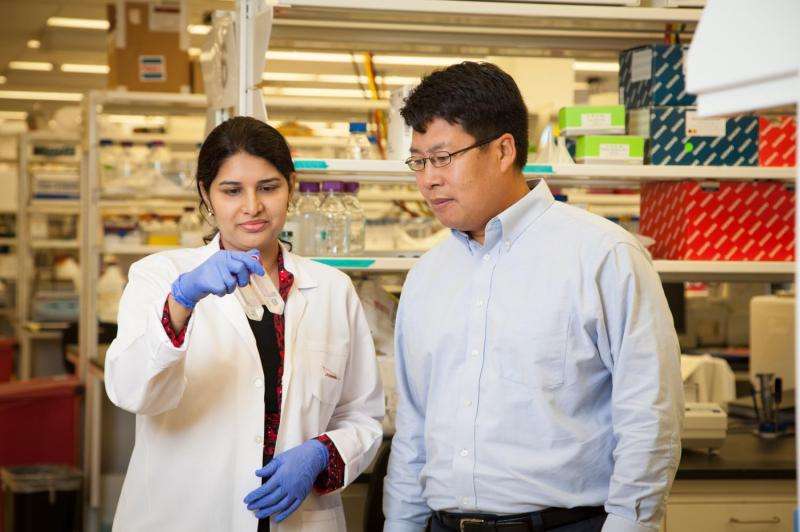Promising target for new drugs found in pancreatic cancer cells

Pancreatic cancer is extremely deadly and often has a poor prognosis. Ranked as the fourth deadliest cancer in the U.S. and poised to move up within the next few years, pancreatic cancer is very difficult to detect in its early stages. Seldom diagnosed early and typically spreading rapidly, the disease has no effective treatment once it advances.
University of Houston researchers are on a mission to develop drugs that will allow physicians to prolong patient survival and, possibly, even eradicate this deadliest of cancers.
"Our research on the role of liver X receptors, or LXRs, in pancreatic cancer cells points to a promising target and strategy in the treatment of pancreatic cancer," said cancer biologist Chin-Yo Lin, an assistant professor with the UH Center for Nuclear Receptors and Cell Signaling (CNRCS). "We examined the levels of LXRs in patient tumor samples and studied the effects of candidate drug compounds targeting LXRs on cultured pancreatic cancer cells."
Liver X receptors are important regulators of cholesterol, glucose metabolism and inflammatory response modulation. Collaborating with CNRCS director Dr. Jan-Åke Gustafsson, a pioneer in the discovery of LXRs and the Robert A. Welch Professor in Biology and Biochemistry in the UH College of Natural Sciences and Mathematics, Lin said there is now enough evidence to support the involvement of LXRs in a variety of malignancies.
Lin and his colleagues anticipate their ongoing studies will help determine whether LXRs are expressed in all tumors or a specific subset of tumors that might be more sensitive to drugs targeting LXRs. Another goal is to test the effects of the drugs on pancreatic tumors in murine models that are very similar to those found in humans. Ultimately, they plan to use the knowledge from these studies to develop better drugs to target LXRs in pancreatic cancer, as well as other types of malignancies.
The research team has already carried out some preliminary studies of LXR expression in patient tumor samples and is preparing to analyze more samples. Recent studies showed that chemical compounds targeting LXRs can slow the growth of tumors in murine models transplanted with human tumor cells.
"Our findings point to a class of receptors that can be precisely targeted by drug compounds and are expected to stimulate both basic and translational research on their functions and application as a drug target," Lin said. "Long-term goals are to develop additional drug compounds and clinical testing in human subjects, which will require several more years of research."
A number of students participated in these studies, including Ph.D. students Sridevi Addanki and Husna Karaboga and recent Ph.D. graduates Nicholes R. Candelaria, Trang Nguyen-Vu, Prasenjit Dey, Philip Jonsson, Jean Lin and Lakshmi Reddy Bollu. Other collaborators were professor William E. Fisher from the Baylor College of Medicine, who provided the clinical samples, and researchers Knut Steffensen and Lise-Lotte Vedin from the Karolinska Institute in Sweden, who assisted with the analysis, as well as provided some of the drug compounds.
Their research was funded by Golfers Against Cancer and a pilot study grant from the Cancer Prevention and Research Institute of Texas (CPRIT). Following the publication of some findings in the research journal PLOS ONE last year, Lin and Gustafsson recently summarized these and other advances in targeting LXRs in cancer treatments in an invited review article for Nature Reviews Cancer, a monthly journal devoted to the review of current topics in oncology.
"Our next steps are to collect more information from patient samples and data from pre-clinical studies," Lin said. "Based on the results, we will then move forward with clinical studies using existing compounds or partner with biotech or pharmaceutical companies to develop better drug candidates."



















